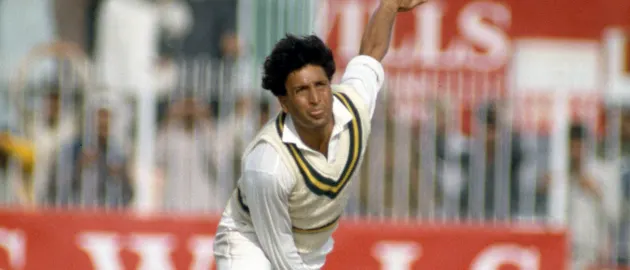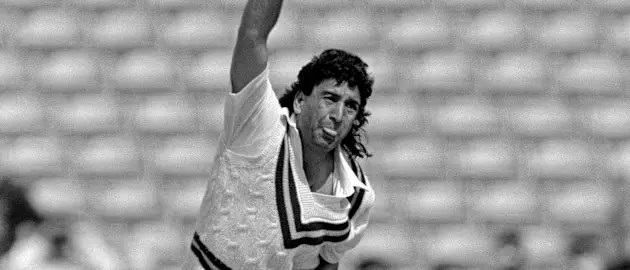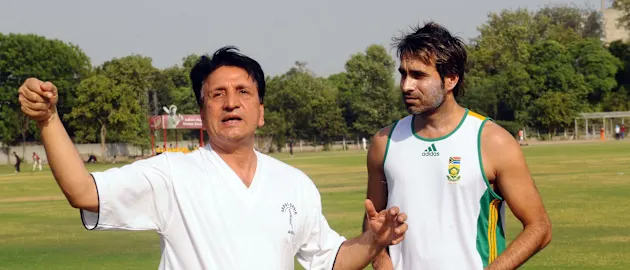Obituary: Abdul Qadir


A national icon, Qadir enjoyed a 13-year international career, playing 67 Tests and 104 ODIs in that time. His 236 Test wickets place him second among Pakistan's all-time leading spinners, behind Danish Kaneria. In ODIs, he finished with 132 wickets at 26.16, including two five-wicket hauls.
Qadir was Pakistan’s hero during their tour of England in 1987, when they picked up their first series win in the country. His contributions included a match haul of 10/211 in the fifth Test that helped Pakistan keep their lead intact and win the series.
Later, when England visited Pakistan for a return tour that same year, Qadir destroyed the opposition once again, snaring 30 wickets in three matches. It was an effort that included both his career-best innings figures, 9/56, and best match haul, 13/101. The former stands to date as a Pakistan record.

Those performances, though, weren't anything out of the ordinary. England had always been left spellbound by Qadir's magic, so much that ahead of their 1982 tour of the country, Imran Khan, the then Pakistan captain, and the man under whose leadership Qadir produced many of his finest Test performances, urged a then-26-year-old Qadir to grow a goatee as a way of adding to his mystique and further beguile the Englishmen.
By the time he finished his career, Qadir had 21 wickets in England, his most in any country outside home, and 82 wickets against them overall – almost double the number of wickets he got against his next favourite opposition, Australia, against whom he had 45 wickets in 11 Tests. Qadir also enjoyed great success against the legendary West Indies team of the 1980s, winding up with 42 wickets against them.
Qadir was also a pioneer of the art of wrist-spin in limited-overs cricket. Long before it became the fad that it is today, Qadir was letting googlies rip in ODIs. He played important roles in Pakistan's World Cup campaigns in 1983 and 1987, during both of which they made the semi-finals, picking up 24 wickets in 13 matches.

Qadir's contributions to cricket extend well beyond the field. A willing advisor to youngsters, Qadir mentored fellow countrymen Mushtaq Ahmed, Danish Kaneria and Shahid Afridi, as well as Australia's Shane Warne and South Africa's Imran Tahir. Paying tribute, Kaneria said of his hero: “It is a great loss to Pakistan cricket because it was Qadir *bhai’*s leg-spin magic and artistry that inspired a generation of young leg-spin bowlers in Pakistan and around the cricket world.”
In his book, Shane Warne's Century: My Top 100 Test Cricketers, Warne had written of Qadir: "One of the most interesting nights of my life was at Qadir's house when we sat on the floor and flipped an orange to each other with different grips and forms of spin and discussed tactics and how to sum up batsmen. That was an education and a very good night between two spinners."
Qadir also served as Pakistan’s chief selector, a post he was appointed to in November 2008, but it was short-lived, ending with his resignation after six months. After winding up his international career, which ended when he was edged out of the side by protégé Mushtaq, Qadir ran a private academy near Lahore's Gaddafi Stadium.
PCB is shocked at the news of 'maestro' Abdul Qadir's passing and has offered its deepest condolences to his family and friends. pic.twitter.com/NTRT3cX2in
— Pakistan Cricket (@TheRealPCB) September 6, 2019
"We are devastated with the news of Abdul Qadir's passing, and on behalf of the PCB, I want to express my deepest condolences to his family and friends," Ehsan Mani, the chairman of the Pakistan Cricket Board, said.
"The PCB, like every Pakistani, is proud of his services to cricket and Pakistan. His contributions and achievements were not only limited on-field, but he ensured he transferred the art of leg-spin to the up-and-coming cricketers.
"Apart from being a maestro with the ball, Abdul Qadir was a larger-than-life figure who was adored, loved and respected across the globe due to his excellent understanding and knowledge of the game, and strong cricket ethics and discipline. Today, global cricket has become poorer with his passing. He will be missed, but will never be forgotten."
